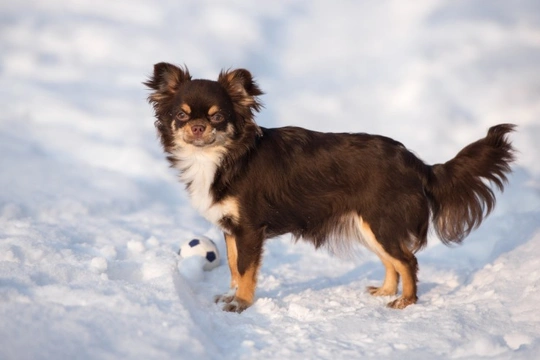
Tips on How to Walk Your Dog Safely in the Snow
Winter can be a lovely time of the year and most dogs love the snow, they get very silly as they run around in it, ploughing their noses through it and basically playing the fool. That's great when you can let them off the lead in the park or when they run around a back garden, but it's important to stay safe when walking your dog on a lead in the snow and this is particularly true if they have reached their golden years.
Keeping Nice and Warm
The first and foremost important thing is to make sure both you and your canine companion are nice and warm. The best way to ensure you and your dog don't get too cold when out on a walk in the snow, is to make sure you have lots of layers on and that your dog wears a coat too if they don't have a thick double coat to protect them. The extra layer a coat provides adds the all-important extra protection against the cold they need to stay comfortable. The trick is to make sure you buy a coat that fits your pet snugly and that it's easy to take on and off them!
Using a Pet-safe Product to Keep Pathways Clear
There are some very good pet-safe products you can buy to put on your doorstep, pathway and driveway that will keep them clear by preventing any ice from forming on them. It's important to use a pet-safe product because your dog will lick their paws and if they ingest anything toxic, it can make them very ill. It's not a good idea to use salt because it can end up burning your dog's paws which can make life very uncomfortable for them. If you think your dog has walked in any salt, it's important to rinse of their paws as soon as you can when you get home.
Always Wear Gloves
Everyone knows how important it is to wear warm boots when going out in the snow for a walk, but it's important to wear some good quality gloves too. Holding onto a lead in a gloveless hand can cause all sorts of problems as your hands get colder and colder. You might even end up letting go of your pet's lead which could prove very dangerous!
Making Sure Your Dog Does Not Dehydrate
Dogs, and in particular older dogs, can get quite dehydrated very quickly even when the temperature is cold enough for snow. The reason being that they sweat under their warm coats and our older canine companions pant a lot more because they tend to breath heavily when out on a walk. All this can contribute to them dehydrating so it's important you make sure they drink lots of water before they go out for a walk and again when they get back home. However, you need to be careful if you share your home with a deep chested breed, because they may gulp down their water too fast which can lead to them experiencing bloat!
Making Sure Your Dog Does Not Eat Snow
It's never a good idea to let dogs eat any snow because you never know what's in it. Snow and ice can harbour a lot of bacteria and other nasty things which could end up making your dog very sick. As a rule of thumb, it's best not to let them eat any unless they are running around catching snowflakes that is!
Picking Up "Poop" is Still Essential
You may think that snow hides any dog poo your pet may leave behind but you still need to pick up any mess they make because as the snow melts, the mess left behind just spreads out making it a more dangerous hazard than ever!
Keeping Clean and Dry Towels by the Door
It's also a very good idea to keep plenty of dry, clean towels by the door so that when you get home after a walk, you can wipe your dog's paws dry making sure they are not covered in salt and that no "snow balls" have formed in between their pads. This can make walking very uncomfortable for them, not to mention that leaving these balls between their toes could result in their feet getting sore which then makes the perfect environment for bacteria to take hold and a serious infection.
Conclusion
Taking your dog out for a walk in the snow is great fun, but you need to take extra care to make sure you both stay safe and warm. Older dogs in particular need to be wrapped up warmly so they don't get too cold and it's best to take them out for short walks when there's snow on the ground for that reason. It's also important to check your pet's paws and to rinse them off if you think your dog may have walked on any salted paths or roads. Taking extra care in the snow means both you and your dog can enjoy yourselves when out on walk in the winter time.



